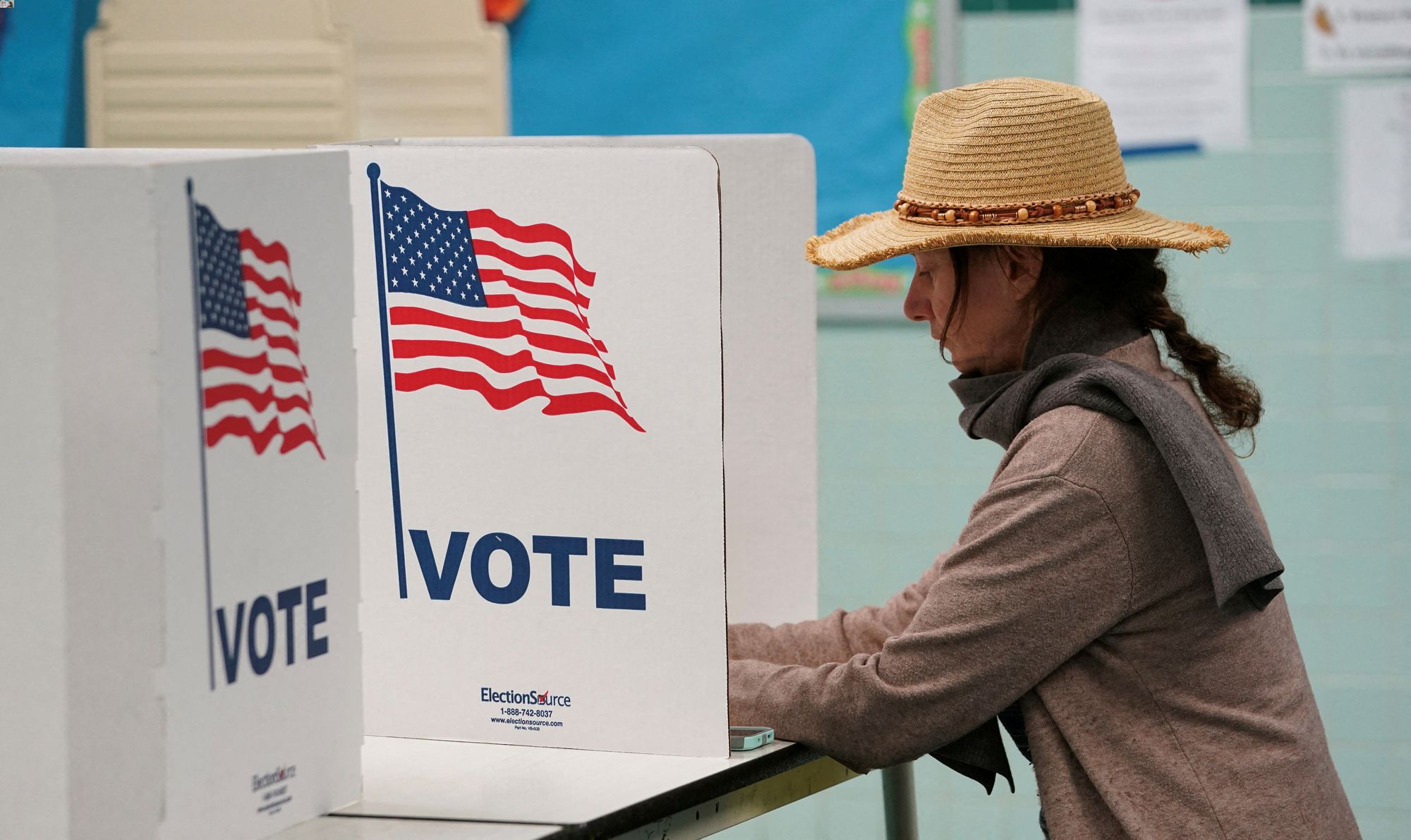
Election Day 2024 is set to be one of the most significant events in American history. Scheduled for November 5, 2024, this day will determine the next President of the United States. The main contenders are Vice President Kamala Harris for the Democrats and former President Donald Trump for the Republicans. This election is unique, with Trump being the first major party candidate under criminal indictment. Voter turnout is expected to be high, with over 160 million Americans likely to cast their ballots. The election process, voter trust, and the role of AI in information dissemination are key issues shaping this pivotal day.
Key Takeaways:
- Election Day 2024 will be historic, with Kamala Harris and Donald Trump as the main candidates. The legal and administrative aspects, voting methods, and global context will all play crucial roles in shaping the outcome.
- Public trust in election information is low, with skepticism about AI tools and campaign messages. Fact-checking is vital to ensure accurate information during the election, as claims from candidates can be misleading.
50 Facts About Election Day 2024
Election Day 2024 is shaping up to be one of the most significant events in recent American history. With high stakes, intense scrutiny, and a global context, this election will be watched closely by millions. Here are 50 key facts to keep you informed.
Key Dates and Candidates
Understanding the timeline and the main players is crucial for following the election.
- Election Date: The 2024 U.S. presidential election is scheduled for November 5, 2024.
- Candidates: The Democratic nominee is Vice President Kamala Harris, while the Republican nominee is former President Donald Trump.
Legal and Administrative Aspects
The legal landscape and administrative processes play a significant role in how the election unfolds.
- Historic Indictments: Donald Trump is the first major party candidate to be under criminal indictment in a U.S. presidential election. His indictment includes charges related to business fraud, removal of classified documents, and efforts to overturn the 2020 election.
- Election Turnout: Roughly 244 million Americans will be eligible to vote in the 2024 election, with over 160 million expected to cast ballots if turnout matches the record set in 2020.
- Voter Registration: More than 160 million Americans are registered to vote, with significant efforts underway to ensure voter registration and participation.
- Election Process: Federal law requires military ballots to be sent out 45 days before Election Day, which means the presidential primary ballot is locked in every state by early April.
- Ballot Finalization: Ballots for the 2024 general election must be finalized by early September, although litigation on various issues may extend beyond this date.
Voting Methods and Administration
How votes are cast and counted can impact the election's outcome and public trust.
- Voting Methods: Some states and counties are considering changing from machine counting of ballots to hand counting, which could lead to slow reporting of results and increase distrust in the system.
- Election Administration: Election administration has improved dramatically over the past decade, but progress has been uneven. Only Georgia and Colorado meet all minimum standards for election administration across voter registration, casting ballots, and counting results in return for federal funding.
- Certification Deadlines: States’ certification deadlines range from two to 29 days post-Election Day, emphasizing the importance of quick and accurate tabulation of results.
- Potential Pitfalls: The post-Election Day process is littered with potential pitfalls, including local certification of vote totals and prolonged litigation, which can threaten to put Americans’ votes at risk.
- Electoral College Deadlines: Electoral College deadlines for presidential elections are immovable, and protracted litigation around local certification threatens to impact election outcomes.
- State Deadlines Alignment: Not all state deadlines align with those established by the Electoral Count Reform Act, which could lead to further complications in the election process.
Global Context
The 2024 election is part of a broader global landscape of significant elections.
- Record-Breaking Elections: 2024 is a record-breaking year for elections globally, with more than 2 billion voters set to go to the polls in 50 countries, including the United States, India, and Mexico.
- India’s Largest Election: India’s election, scheduled between April and May 2024, will be the world’s largest, with over 900 million registered voters out of a population of 1.4 billion.
- Mexico’s First Female Candidates: For the first time in Mexico’s history, the two leading presidential candidates are women: Claudia Sheinbaum Pardo and former senator Xóchitl Gálvez.
- European Union Elections: The European Union will hold elections for the European Parliament between June 6 and 9, 2024, with over 400 million voters electing 720 members across 27 member countries.
- South Africa’s Crucial Election: South Africa’s election in 2024 is expected to be the country’s most important for 30 years, with uncertainty about whether the African National Congress (ANC) can maintain its majority.
- Global Geopolitical Volatility: Geopolitical volatility is the biggest risk identified in the World Economic Forum’s Chief Risk Officers Outlook 2023, highlighting potential geopolitical risks in 2024.
- Civic Participation Impact: Civic participation is affecting economies, industries, and global issues, with the World Economic Forum improving trade for more resilient societies through its digital platform.
Public Skepticism and Trust
Public trust in election information and sources is a critical issue heading into November 2024.
- Public Skepticism: A new study from The Associated Press-NORC Center for Public Affairs Research and USAFacts finds high levels of skepticism in election information heading into November 2024. People agree on basic standards for factual information but struggle to get accurate information about candidates.
- Trust in Information Sources: Only 10% of the public places a great deal of trust in information about the government on social media, despite 40% using social media daily for government-related information.
- AI Skepticism: The public is skeptical about the reliability of AI tools for information. Half of adults are concerned about AI’s future impact on how they get information, and only 9% are excited about it.
- AI Trust Levels: Only 27% trust AI even a moderate amount to provide accurate information about the election outcome in November, and 43% think AI will make it more difficult to find factual information compared to just 16% who think it will make it easier.
- Campaign Message Trust: 57% of adults think Donald Trump’s campaign messages are rarely or never based on factual information, and 45% express similar doubts about Kamala Harris’s campaign.
- Party Trust Levels: More Republicans trust Trump and his campaign (67%) than government certifications of election results (51%) for accurate information on the outcome of the November election. In contrast, Democrats show similar levels of trust in government certifications (87%) and Harris and her campaign (82%).
- Government Information Trust: Nearly half believe information from the federal government is influenced by the political beliefs of officials such as the president (49%) or members of Congress (48%). Just 10% of adults think decisions by policymakers are always or often grounded in factual information.
- Social Media Usage: Despite low trust in government information on social media, 40% of adults report using social media at least once a day for government-related information.
- Immigration and Election Issues: Information from the government on issues like immigration, elections, the environment, and foreign affairs is met with mistrust, with about half of adults saying they trust it only a little or not at all.
Fact-Checking and Claims
Fact-checking plays a vital role in ensuring accurate information during the election.
- Debate Fact-Checking: The presidential debate between Trump and Harris saw numerous fact-checking issues, including claims about manufacturing job losses, the Russia-Ukraine conflict, U.S. military in combat zones, and more.
- Manufacturing Job Losses: Prior to the pandemic, the U.S. saw an increase of approximately 500,000 manufacturing jobs during Trump’s presidency. However, by the time he left office, the country had lost most of those gains due to the pandemic’s economic impact.
- Ending the Russia-Ukraine Conflict: Harris highlighted the Biden administration’s efforts to unify international support for Ukraine, arguing that if Trump were president, "Putin would be sitting in Kyiv right now".
- U.S. Military in Combat Zones: Harris claimed that U.S. military members are not in combat zones, which is incorrect. U.S. troops remain engaged in combat operations in locations such as Iraq and Syria.
- Trump’s Obamacare Claims: Trump said he saved the Affordable Care Act, which is misleading. During his administration, he attempted to repeal the ACA multiple times, and while unsuccessful, Congress did eliminate the individual mandate that imposed fines on those without health insurance.
- Trump’s Election Fraud Cases: Trump claimed that no judges looked at his election fraud cases and that they were dismissed due to lack of standing. This is misleading; most lawsuits were rejected for lack of evidence rather than standing, a point supported by Attorney General William Barr.
- Crime Rates and Immigration: Trump’s assertion that "migrant crime" is rampant is misleading. Recent FBI statistics indicate a significant drop in violent and property crime rates. Despite Trump’s claims, crime has generally decreased across the U.S., including in cities with high immigrant populations.
- Noncitizen Voting: Trump alleged that illegal immigrants are being encouraged to vote, which is false. Voting as a noncitizen is illegal in all state and federal elections, and there is no evidence supporting claims that efforts are being made to facilitate this.
- Energy Under Harris: Trump claimed that under Harris, fossil fuels would be "dead." This is inaccurate; oil and gas production has reached record highs under the Biden administration, and renewable energy sources are expanding rapidly.
- Trump’s Comments on Election Outcomes: Harris referred to Trump’s previous comments about a potential "bloodbath" if he does not win the upcoming election, a statement that Trump later downplayed. This claim is based on Trump’s rally remarks, where he suggested dire consequences if he were not elected.
- Responsibility for Afghanistan Withdrawal: Trump criticized the Biden administration for the chaotic troop withdrawal from Afghanistan, suggesting accountability is lacking. While it’s true that no Biden officials were dismissed, both Trump and Biden share responsibility for the circumstances surrounding the withdrawal.
- Transgender Operations for Incarcerated Individuals: Trump’s claim that Harris supports transgender surgeries for incarcerated immigrants needs context. Harris previously indicated that individuals in state care, including prisoners, should have access to gender transition treatment.
- Migrant Pet Harm Claims: Rumors about Haitian immigrants harming pets have been debunked by local law enforcement, who stated there are no credible reports to support these claims.
- Job Recovery Under Biden: Trump’s assertion that the jobs created under Biden are merely "bounce-back" jobs is incorrect; the U.S. has created more than six million jobs since regaining those lost during the pandemic.
- Inflation Claims: Trump’s statement about inflation being the worst in history is misleading, as inflation rates have fluctuated and are currently at significantly lower levels than during certain periods of his presidency.
- Project 2025 Association: Trump’s denial of involvement with Project 2025, a policy document from the Heritage Foundation, is misleading. While he claims no ties to it, many of his allies have pushed for the policies outlined within.
- Immigration Numbers: Trump’s claim of "21 million" migrants entering the U.S. monthly is inaccurate; official estimates suggest around 10 million encounters at the border during Biden’s tenure.
- Tax Cuts and Deficits: The impact of tax cuts and deficits on the economy is a contentious issue, with different parties presenting varying perspectives on their effects.
Election Administration Standards
Meeting election administration standards is crucial for ensuring a fair and transparent election.
- Election Administration Standards: Only Georgia and Colorado meet all minimum standards for election administration across voter registration, casting ballots, and counting results in return for federal funding. Other states meet at least three-quarters of these standards.
- Potential Litigation Issues: The post-Election Day process is littered with potential pitfalls, including local certification of vote totals and prolonged litigation, which can threaten to put Americans’ votes at risk.
Global Election Landscape
The 2024 election is part of a broader global landscape of significant elections.
- Global Election Landscape: 2024 is a record-breaking year for elections globally, with more than 2 billion voters set to go to the polls in 50 countries, including the United States, India, and Mexico.
Election Day 2024: A Crucial Moment
Election Day 2024 is shaping up to be one of the most significant events in recent history. With Kamala Harris and Donald Trump as the main contenders, the stakes couldn't be higher. Trump's unique position as the first major party candidate under criminal indictment adds an unprecedented twist. Voter turnout is expected to be massive, with over 160 million Americans likely to cast their ballots. The process will be closely watched, especially given the potential for slow reporting and litigation issues. Globally, 2024 is a record-breaking year for elections, highlighting the importance of civic participation. Public skepticism about election information and AI tools remains high, making reliable sources crucial. As Americans head to the polls, they'll be part of a global phenomenon that underscores the evolving nature of democracy in the digital age.
Frequently Asked Questions
Was this page helpful?
Our commitment to delivering trustworthy and engaging content is at the heart of what we do. Each fact on our site is contributed by real users like you, bringing a wealth of diverse insights and information. To ensure the highest standards of accuracy and reliability, our dedicated editors meticulously review each submission. This process guarantees that the facts we share are not only fascinating but also credible. Trust in our commitment to quality and authenticity as you explore and learn with us.


